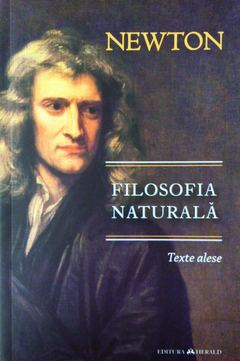- Bible
- Read the Bible
- Bible Versions
- Verse of the Day
- Reading Plans
- Verses by Topic
- Books of the Bible
- Bible Images
- Study
- Commentaries
- Concordances
- Dictionaries
- Encyclopedias
- Sermons
- Bible Atlas & Maps
- BP Wiki
- Devotionals
- Today's Devotionals
- Light of the World
- All Devotionals
- Inspirational Quotes
- More
- Picture Quotes
- Videos
- Inspirational
- Bible Study
- What The Bible Says
- Bible Q&As
- Daily Bread
- Bible by Genre
- Bible Stories
- Random Bible Verse
- Community
- Store
Filosofia naturala
by Isaac Newton
Numele lui Isaac Newton este de obicei asociat cu formularea legilor miscarii si ale agravitatiei universale, precum si cu dezvoltarea teoriei culorii. Exista insa o latura mai putin cunoscuta a marelui om de stiinta, surprinsa in acest volum prin traducerea in premiera in limba romana – pe langa segmentele din tratatele sale celebre – a unor articole, scrisori si fragmente de manuscris. Astfel, cititorul roman se poate edifica asupra unor teme din gandirea newtoniana care tin atat de metoda experimentala si formularea ipotezelor stiintifice, cat si de creatia lumii, planul divin si relatia dintre Dumnezeu si legile naturii. Filosofia naturala se adreseaza, prin urmare, tuturor celor interesati, de stiinta si de istoria ideilor in general.
BUY NOW
Paperback, 256 pages
Published 2015 by HERALD
© 2025 Bibleportal.com All rights reserved.

Sir Isaac Newton was an English physicist, mathematician, astronomer, natural philosopher, alchemist, and theologian who is considered one of the most influential people in human history.
Newton remains influential to scientists, as demonstrated by a 2005 survey of scientists in Britain's Royal Society asking who had the greater effect on the history of science, Newton or Albert Einstein. Newton was deemed the more influential.[8]
Newton also wrote on Judaeo-Christian prophecy, whose decipherment was essential, he thought, to the understanding of God. His book on the subject, which was reprinted well into the Victorian Age, represented lifelong study. Its message was that Christianity went astray in the 4th century AD, when the first Council of Nicaea propounded erroneous doctrines of the nature of Christ. The full extent of Newton's unorthodoxy was recognized only in the present century: but although a critic of accepted Trinitarian dogmas and the Council of Nicaea, he possessed a deep religious sense, venerated the Bible and accepted its account of creation. In late editions of his scientific works he expressed a strong sense of God's providential role in nature.
... Show more